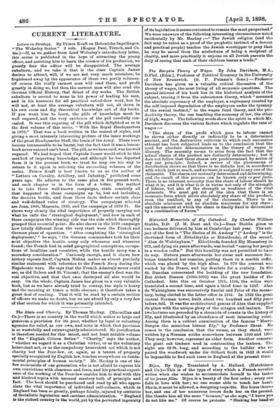CURRENT LITERATURE.
Letters on Strategy. By Prince Kraft zu Hohenlohe Ingelfingen. "The Wolseley Series." 2 vols. (Kegan Paul, Trench, and Co. 30s.)—If, as we gather from Lord Wolseley's introductory letter, this series is published in the hope of attracting the young officer, and assisting him to learn the science of his profession, we greatly fear the editor will be disappointed. The average subaltern, and we take it that is the class Captain James desires to attract, will, if we are not very much mistaken, be frightened away by the appearance of these two portly volumes. Of course the really earnest man will read them, and profit greatly in doing so, but then the earnest man will also read the German Official History, that driest of dry works. The British subaltern is second to none in his power of leading his men, and in his keenness for all practical out-of-door work, but he will not, at least the average subaltern will x.e.-4z, sit down in his own room and dig theoretical knowledge out of dry books. If you want him to learn, the pills of knowledge must be well sugared, and the very existence of the pill carefully con- cealed. It was this sugaring of the pill which delighted us so in the first volume of this series, "With the Royal Headquarters in 1870." That was a book written in the easiest of styles, and giving a most intensely interesting picture of the inner workings of the great Headquarter Staff, the brain of the Army. There were lessons innumerable to be learnt, but the fact that it was a lesson- book never entered one's head. The pill, as we have said, was too well sugared. We had hoped that Captain James would stick to this method of imparting knowledge, and although he has departed from it in the present book, we trust he may see his way to return to it again in selecting the succeeding volumes of the series. Prince Kraft is best known to us as the author of "Letters on Cavalry, Artillery, and Infantry," published some years ago. He adheres to the same plan in the present work, and each chapter is in the form of a letter. His method is to take three well-known campaigns, state concisely all that happened in those campaigns up to, but not including, the decisive battle, and from those facts deduce certain clear and weld-defined rules of strategy. The campaigns selected ape Jena, 1806, Magenta, 1859, and the campaign of 1870 71. He shows very clearly the vital importance of properly carrying out what he calls the "strategical deployment," and how in each of these campaigns the winning side was the side which thoroughly grasped this essential point. He also shows in the 1870 campaign how totally different from the very start were the French and German plans of operation. "After completing the 'strategical deployment,'" he says, "the German commanders took for their next objective the hostile army only whenever and wherever found ; the French had in mind geographical conceptions, occupa- tions of localities and countries, while the hostile army was a secondary consideration." Curiously enough, and it shows how history repeats itself, Captain Mahan makes an almost precisely similar statement with reference to the French Navy during the Napoleonic wars. He says that the French Admirals never could see, as did Nelson and St. Vincent, that the enemy's fleet was the real objective, and that that once destroyed all else would be easy. On the whole, Captain James has given us a very valuable book, but as we have already tried to convey, the style is heavy and the meaning at times a trifle obscure ; it therefore takes a great deal of reading. That it will be read by a certain section of officers we make no doubt, but we are afraid by only a very few of that section for which it was primarily intended.


































 Previous page
Previous page